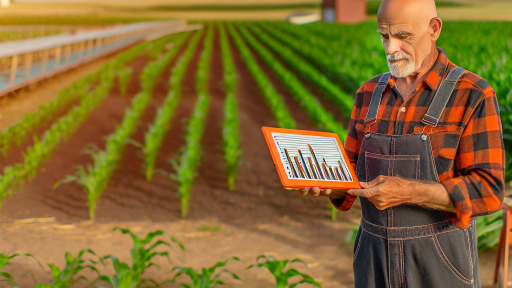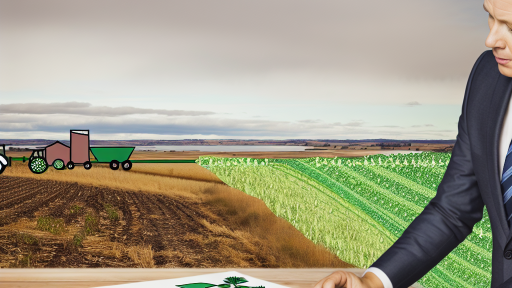Understanding the Concept of Agritourism and Its Benefits for Farmers
Defining Agritourism
Agritourism involves inviting visitors to farms for recreational experiences.
This concept blends agriculture with tourism activities.
Guests can participate in crop harvesting, farm tours, and workshops.
Engaging visitors creates memorable interactions with farming practices.
Economic Benefits
Agritourism can significantly boost a farm’s income.
It provides an additional revenue stream beyond traditional farming.
This diversification helps farmers stabilize their finances.
Moreover, agritourism draws visitors who may purchase farm products.
Increased product sales can boost a farmer’s profit margin.
Community Engagement
Agritourism fosters a connection between farmers and their local communities.
Farm events bring people together and celebrate agricultural heritage.
Farmers can educate visitors on sustainable practices and local crops.
This awareness promotes respect for agricultural work and local resources.
Marketing Opportunities
Using agritourism can enhance a farmer’s marketing strategy.
It enables farms to showcase their unique products and experiences.
Transform Your Agribusiness
Unlock your farm's potential with expert advice tailored to your needs. Get actionable steps that drive real results.
Get StartedSocial media platforms amplify outreach and attract more visitors.
Creative marketing can lead to increased visibility and customer loyalty.
Environmental Awareness
Agritourism educates the public about environmental stewardship.
Visitors learn about sustainable practices and conservation efforts.
Such experiences can inspire visitors to support local farming initiatives.
Ultimately, agritourism promotes a healthier lifestyle and ecosystem.
Identifying Seasonal Themes and Their Appeal to Visitors
Understanding Seasonal Themes
Seasonal themes create unique experiences for visitors.
They reflect the characteristics of each season.
Spring offers blooming flowers and fresh produce.
Summer highlights outdoor activities and sunshine.
Fall showcases harvest festivities and colorful foliage.
Winter introduces cozy settings and festive holidays.
Engaging Visitors with Seasonal Attractions
Seasonal events attract diverse audiences.
Families seek fun activities during school breaks.
Friends look for memorable outings on weekends.
Couples appreciate romantic themes for date nights.
Understanding your audience helps tailor experiences.
Popular Seasonal Themes
- Spring Festivals: Celebrate local flowers and planting.
- Summer Barbecues: Offer grilling classes and tastings.
- Harvest Festivals: Host apple picking and hayrides.
- Winter Markets: Feature local crafts and holiday treats.
Creating Unique Experiences to Attract Visitors
Unique experiences differentiate your farm from others.
Consider incorporating local traditions into events.
Invite local music bands to enhance the atmosphere.
Offer farm tours to educate visitors about agriculture.
Engage guests with hands-on activities, such as picking.
Marketing Seasonal Events
Effective marketing reaches potential visitors.
Utilize social media to showcase your events.
Showcase Your Farming Business
Publish your professional farming services profile on our blog for a one-time fee of $200 and reach a dedicated audience of farmers and agribusiness owners.
Publish Your ProfileShare beautiful photos and testimonials from past guests.
Collaborate with local influencers for wider reach.
Create event-specific hashtags to increase visibility.
Planning and Logistics: Key Considerations for Seasonal Events
Identifying Your Target Audience
Understanding your target audience is crucial for successful event planning.
Identify the demographics that are most likely to visit your farm.
Consider families, school groups, and local community members.
Gather data through surveys or social media insights.
Choosing the Right Time and Date
Selecting the right time and date can significantly impact attendance.
Avoid scheduling conflicts with major local events or holidays.
Pay attention to weather patterns, especially during seasonal events.
Communicate the chosen date well in advance to your audience.
Logistics and Infrastructure
Evaluate your farm’s layout for event logistics and flow.
Ensure there is sufficient parking for visitors.
Designate areas for activities, vendors, and relaxation spots.
Consider restroom facilities and accessibility for all guests.
Permits and Regulations
Check local regulations regarding hosting public events.
Apply for necessary permits well ahead of the event date.
Ensure compliance with health and safety standards.
Consult with local authorities if unsure about requirements.
Marketing and Promotion
Promote your event through various marketing channels.
Utilize social media platforms to reach a wider audience.
Engage local media outlets for coverage and interest.
Consider creating posters and distributing flyers in community hotspots.
Planning Activities and Attractions
Design activities that engage and entertain your visitors.
Include seasonal themes, such as pumpkin picking in the fall.
Organize workshops, tours, and demonstrations for hands-on experiences.
Incorporate local food vendors to enhance the visitor experience.
Staffing and Volunteers
Recruit staff and volunteers to assist during the event.
Train them on duties and responsibilities well in advance.
Ensure they are friendly, knowledgeable, and approachable.
Recognize their contributions with appreciation or incentives.
Measuring Success
After the event, evaluate its success through various metrics.
Gather feedback from visitors via surveys and discussions.
Analyze attendance numbers compared to your goals.
Identify areas for improvement for future events.
See Related Content: Diversification Through Specialty Crop Production
Creating Engaging Activities That Showcase Farm Operations
Highlight Essential Farming Practices
Engaging visitors starts with showcasing essential farming practices.
Provide guided tours that explain daily farm operations.
Demonstrate planting, harvesting, and animal care techniques.
Visitors appreciate the hands-on experience.
Showcase Your Farming Business
Publish your professional farming services profile on our blog for a one-time fee of $200 and reach a dedicated audience of farmers and agribusiness owners.
Publish Your ProfileThey find value in understanding where their food comes from.
Host Themed Events Throughout the Seasons
Themed events can attract diverse visitor groups throughout the year.
In spring, consider a planting festival with live demonstrations.
Summer can feature fruit-picking experiences with family-friendly activities.
During autumn, organize a harvest festival complete with hayrides.
Winter events might include holiday-themed markets or craft workshops.
Incorporate Educational Workshops
Education adds depth to farm visits.
Offer workshops on sustainable farming techniques and organic practices.
Invite local experts to lead sessions on cooking with farm-fresh ingredients.
Provide children’s programs focused on agriculture and nature.
These workshops enhance the overall visitor experience.
Encourage Interaction with Farm Animals
Interaction with animals captivates visitors of all ages.
Set up petting areas where guests can meet friendly animals.
Organize demonstrations on animal feeding and care.
Consider offering short educational talks about animal welfare and breeds.
This hands-on approach fosters a connection between visitors and animals.
Utilize Local Partnerships for Enrichment
Collaborating with local businesses enriches the visitor experience.
Invite local chefs to showcase recipes using farm products.
Partner with artisans at farmers’ markets to enhance seasonal events.
Collaborate with schools for educational field trips and programs.
These partnerships create memorable experiences while supporting the community.
See Related Content: Implementing Sustainable Practices In Agritourism Operations
Marketing Strategies to Promote Seasonal Farm Events
Know Your Audience
Identify the target demographic for your seasonal farm events.
Engage with local communities to understand their interests.
Consider families, tourists, and food enthusiasts as potential visitors.
Gather feedback to refine your event offerings.
Create Engaging Content
Develop enticing content that highlights your farm’s unique experiences.
Utilize storytelling to connect emotionally with your audience.
Share behind-the-scenes looks at event preparations.
Incorporate high-quality images and videos on your platforms.
Utilize Social Media Effectively
Leverage social media platforms to promote your events.
Create event pages on Facebook and Instagram for visibility.
Share regular updates to build excitement leading up to the event.
Encourage user-generated content to foster community engagement.
Collaborate with Local Businesses
Partner with local businesses for cross-promotion opportunities.
Consider collaborating with restaurants, hotels, and agencies.
Offer packages that include farm events with local attractions.
This strategy increases reach and benefits all partners involved.
Leverage Email Marketing
Compile an email list of interested visitors and previous attendees.
Send well-crafted newsletters highlighting upcoming events.
Showcase Your Farming Business
Publish your professional farming services profile on our blog for a one-time fee of $200 and reach a dedicated audience of farmers and agribusiness owners.
Publish Your ProfileInclude enticing visuals and exclusive offers to encourage attendance.
Segment your audience to tailor messages effectively.
Host Pre-Event Activities
Launch smaller pre-event activities to gauge interest.
These can include workshops, farm tours, or seasonal tastings.
Offer discounted rates to attendees who sign up early.
Use these events as a platform to promote the main event.
Utilize Local Media and Influencers
Engage local media outlets to promote your farm events.
Write press releases highlighting unique aspects of your events.
Invite local bloggers and influencers to experience your farm.
Encourage them to share their experiences on social media.
Monitor and Analyze Feedback
Post-event feedback is essential for future success.
Use surveys to gather insights from attendees.
Analyze which promotional strategies were most effective.
Adjust your marketing plans based on this data for improvement.
Delve into the Subject: Sustainable Supply Chain Strategies for Modern Farmers

Building Partnerships with Local Businesses and Organizations
Identifying Potential Partners
Start by identifying local businesses that complement your farm’s offerings.
Look for restaurants, shops, and service providers nearby.
Consider organizations that focus on tourism, agriculture, or community development.
Creating Collaborative Events
Collaborate with local businesses to host joint events.
For example, plan farm-to-table dinners with nearby restaurants.
Additionally, you could feature local artisans in seasonal markets.
This approach highlights community talents and attracts diverse visitors.
Promoting Your Partnerships
Use social media to promote collaborations with local businesses.
Share engaging content that showcases partner highlights.
Moreover, send out joint newsletters to reach a wider audience.
Leveraging Local Resources
Utilize resources offered by local organizations.
Consider workshops on agritourism hosted by a tourism board.
Engage with local chambers of commerce to access marketing tools.
Building Lasting Relationships
Maintain regular communication with your partners.
Schedule follow-up meetings after events to share feedback.
Additionally, brainstorm new ideas for future collaborations.
This fosters a strong network that benefits everyone involved.
Find Out More: Protect Your Farm: Top Risk Management Tips
Gathering Visitor Feedback and Measuring Event Success
Importance of Visitor Feedback
Gathering visitor feedback is essential for improving farm events.
It provides insights into what visitors enjoy most.
Additionally, feedback highlights areas needing improvement.
Engaging with visitors encourages their return in future seasons.
Methods for Collecting Feedback
Utilize surveys to collect structured responses from attendees.
Online surveys can reach a broader audience more efficiently.
Consider implementing comment boxes at event locations.
Showcase Your Farming Business
Publish your professional farming services profile on our blog for a one-time fee of $200 and reach a dedicated audience of farmers and agribusiness owners.
Publish Your ProfileFace-to-face conversations can yield deeper insights.
Measuring Event Success
Identify key performance indicators to assess success.
Attendance numbers provide a clear measure of popularity.
Sales revenue from events indicates financial success.
Social media engagement levels reflect event reach.
Analyzing Feedback
Sort feedback into categories for easier analysis.
Prioritize feedback based on frequency and significance.
Use both qualitative and quantitative data for a comprehensive view.
Identify common themes to inform future event planning.
Implementing Improvements
Use insights from feedback to make necessary changes.
Test new ideas in smaller events to gauge effectiveness.
Communicate changes to returning visitors to enhance loyalty.
Continuously refine your approach to keep events fresh and engaging.
Sustainable Practices in Event Planning to Reduce Environmental Impact
Incorporating Eco-Friendly Materials
Using sustainable materials is essential for reducing waste.
Choose biodegradable or recyclable items for decorations.
Additionally, select locally sourced products to support regional businesses.
This approach minimizes transportation emissions and promotes the local economy.
Promoting Sustainable Transportation Options
Encouraging guests to carpool can significantly decrease carbon footprints.
Additionally, providing shuttle services helps reduce individual vehicle use.
Promote biking by offering secure bike parking facilities.
Consider working with local transit authorities to enhance accessibility.
Minimizing Food Waste
Plan for meals based on expected attendance to limit excess food.
Work with local food banks to donate any leftover items.
Encourage guests to take home leftovers in reusable containers.
Use compostable dishware for serving to reduce landfill contributions.
Engaging Visitors in Sustainable Practices
Inform guests about your sustainability efforts during events.
Provide educational workshops on waste reduction techniques.
Encourage participants to follow eco-friendly practices during their visit.
Utilize social media to share your sustainable goals and achievements.
Implementing Energy-Efficient Solutions
Utilizing solar-powered lighting significantly decreases energy consumption.
Consider hosting events during daylight hours to save on electricity.
Additionally, use energy-efficient appliances and equipment during activities.
Encouraging participants to unplug devices when not in use is beneficial.
Additional Resources
Agritourism Opportunities – FarmRaise
Factors Associated with the Profitability of Agritourism Operations in …




